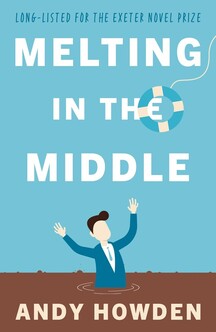 What did being listed for the Exeter Novel Prize mean to you? I think it was a really significant moment in developing my self-confidence as an author. I had received really positive and constructive feedback from my fellow students on the Creative Writing MA at St. Mary’s University, but I had just started to submit to agents, and as any writer will know, those first few replies saying ‘this isn’t quite our thing’ can give you a knock. And of course, it’s rare to get any feedback from an agent. So a little piece of you is still wondering, ‘is this a question of commercial fit or is it that my writing isn’t quite there yet?’ So being listed for the prize and the feedback which showed that the judges ‘got’ my writing and liked it was really affirming - at a point in the process when I most needed it. How much did you bring your own work experience into Melting in the Middle? I’ve experienced many different forms of corporate culture, from working in one big multinational company to observing others from the agency side. So yes, I’ve drawn from experience of situations and characters in office life and judging from the reviews that has resonated with other people who have worked in business. It’s often felt to me that some people seem to become defined by that culture, at the expense of their personal and inner contentment. I’m interested in what happens when they open up to the ‘still, small voices’ in their lives. In the case of my lead character, Stephen, this involves confronting his guilt and searching for a form of redemption amid the often-absurd world of corporate politics. What made you decide to take the Indie road to publishing? I started to explore the agent route, but I was always aware that it was going to be a commercial challenge for an agent to place my story, even if they really liked it. I don’t think my novel sits tightly in any one genre. If I have to label it, I call it comic fiction, but this rarely appeared as a tick box on a literary agent’s submission form. And when I searched what agents were looking for, comic fiction didn’t seem to be high on many of their wish lists. Finally, a friend of mine, Alison Baverstock, Professor of Publishing at Kingston University, who really ‘got’ my novel, said, ‘I’m just not sure it’s an agenty sort of book,’ and suggested looking at other options. She made a telling comment: ‘All I can say, Andy, is that for everyone I know who has gone that route, it’s brought them joy.’ And so far, it largely has!
Edit: Check out Dr Alison Baverstock's book, The Naked Author HERE Do you have a couple of tips for anyone thinking about indie-publishing? Well, firstly, I really would not dissuade anyone from seeking an agent, particularly if you are starting out on the road to get your novel published. Agents clearly bring a degree of ‘quality control’ which helps to ensure we all get to read well-written books. But it’s a clear statistical fact that many people embarking on their debut novel might for various reasons just not be right for an agent. If you’ve challenged yourself to write the book as well as you can, I would set yourself a deadline (‘if I don’t find an agent by this date, I’m looking to another route’) because either going to a small indie publisher direct or self-publishing through a company such as Matador is a really viable alternative way to get your voice heard. The big plusses of this route are that it’s a much quicker process to getting published, and you keep a strong degree of control (my experience is that you are less likely to be asked to make quite radical changes to your story than if you are working with a bigger commercial publisher). And I personally have enjoyed the high degree of involvement in various elements of the process from cover design to defining a marketing strategy. But you do need to be prepared to be rather more ‘hands on’ than if you’re working with a big publishing company. And ultimately it’s a bigger challenge to generate large sales if you are doing it this way. However, you’ll have a real sense of completion in getting your novel out there and learn a lot from the process. If you could take eight books to a desert island, which would they be? Ah, the question any writer would love to be asked! It seems to me you can go for books that you just think are fantastically written or books that mean a lot to you for personal reasons. I think my choices are a mix of both! In rough chronological order…
0 Comments
Your comment will be posted after it is approved.
Leave a Reply. |
What they did next...Scroll down to find out about our previous winners. Archives
April 2024
Categories
All
|
- Home
- What We Do
-
Competitions
- Our Winners
- 2024 Exeter Novel Prize
- 2023 Exeter Novel Prize
- 2023 Exeter Story Prize and Trisha Ashley Award
- 2022 Exeter Novel Prize
- 2022 Exeter Story Prize & Trisha Ashley Award >
- 2021 Exeter Novel Prize >
- 2021 Exeter Story Prize and Trisha Ashley Award >
- 2020 Exeter Novel Prize >
- 2020 Exeter Story Prize and Trisha Ashley Award >
- 2019 Exeter Novel Prize >
- 2019 Exeter Story Prize and Trisha Ashley Award >
- 2019 Exeter Flash Competition >
- 2018 Exeter Novel Prize
- 2018 Exeter Story Prize and Trisha Ashley Award >
- 2018 Exeter Flash Competition >
- 2017 Exeter Novel Prize
- 2017 Exeter Story Prize and Trisha Ashley Award
- 2016 Exeter Novel Prize Award Ceremony and Judge's Report
- 2016 Exeter Story Prize
- 2015 ENP Award Ceremony and Judge's reports
- 2015 ESP, Award Ceremony and Judges' Report
- 2014 ENP Award Ceremony and Judge's Report
- 2013 ENP Award Ceremony and Judge's Report
- 2017 Flash Winners
- 2016 Flash Winners
- 2015 Flash Winners
- 2014 Flash winners
- 2013 Flash Winners
- 2012 Flash Winners
- 2011 Flash Winners
- 2017 Wow! Winners
- 2016 Wow! Winners
- 2015 Wow! Winners
- 2014 Wow! Winners
- About us
- Blog
- Links
- Privacy Policy
Photos from Noah Sussman, Noah Sussman, Noah Sussman, crosescribe, The hills are alive*, Dave_S., h.koppdelaney, twm1340, Cristian V., PoloGoomba, RachelH_, M Glasgow, wendati
- Home
- What We Do
-
Competitions
- Our Winners
- 2024 Exeter Novel Prize
- 2023 Exeter Novel Prize
- 2023 Exeter Story Prize and Trisha Ashley Award
- 2022 Exeter Novel Prize
- 2022 Exeter Story Prize & Trisha Ashley Award >
- 2021 Exeter Novel Prize >
- 2021 Exeter Story Prize and Trisha Ashley Award >
- 2020 Exeter Novel Prize >
- 2020 Exeter Story Prize and Trisha Ashley Award >
- 2019 Exeter Novel Prize >
- 2019 Exeter Story Prize and Trisha Ashley Award >
- 2019 Exeter Flash Competition >
- 2018 Exeter Novel Prize
- 2018 Exeter Story Prize and Trisha Ashley Award >
- 2018 Exeter Flash Competition >
- 2017 Exeter Novel Prize
- 2017 Exeter Story Prize and Trisha Ashley Award
- 2016 Exeter Novel Prize Award Ceremony and Judge's Report
- 2016 Exeter Story Prize
- 2015 ENP Award Ceremony and Judge's reports
- 2015 ESP, Award Ceremony and Judges' Report
- 2014 ENP Award Ceremony and Judge's Report
- 2013 ENP Award Ceremony and Judge's Report
- 2017 Flash Winners
- 2016 Flash Winners
- 2015 Flash Winners
- 2014 Flash winners
- 2013 Flash Winners
- 2012 Flash Winners
- 2011 Flash Winners
- 2017 Wow! Winners
- 2016 Wow! Winners
- 2015 Wow! Winners
- 2014 Wow! Winners
- About us
- Blog
- Links
- Privacy Policy


 RSS Feed
RSS Feed


